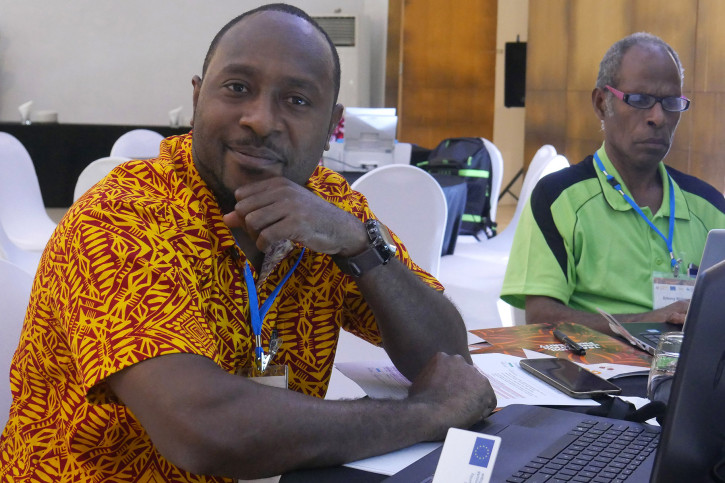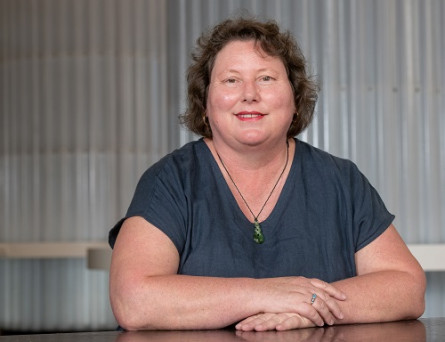Led by ecologist Dr Monica Gruber and globally-recognised social insect expert Professor Phil Lester (pictured below, right), the team has been contributing to invasive species management and biosecurity research and practical initiatives in Australia, New Zealand, Tokelau, Kiribati, Samoa, French Polynesia and Fiji for over 20 years.

Italio Baroroa and Jimmy Risimeri at a Coconut Pests and Diseases workshop © Maria Ronna Luna Pastorizo, Sekiguchi / Pacific Community (SPC)
Pacific Biosecurity is a not-for-profit initiative within Wellington UniVentures at Victoria University of Wellington-Te Herenga Waka which aims to help build resilience to the threat of invasive species throughout the Pacific region, with a primary focus on invasive social insects such as ants and wasps.
Many introduced species provide important benefits for society. However, some introduced plants and animals can cause significant harm to many aspects of human interest, including agriculture, human health and the environment. The best way to manage these invasive species is to prevent their arrival—and the key to this is effective biosecurity.
Ideally, good biosecurity programmes mean that new species are caught at the border (or even before). In reality, not all species can be detected on arrival, and in the time it takes for the newcomers to be noticed, they can already be causing significant damage.
Through collaborations with regional organisations, in-country partners, and experts throughout the region and beyond, Pacific Biosecurity is helping to control invasive species in a way that protects cultural, agricultural and biodiversity values in the Pacific.
Pacific Biosecurity is a founding member of the Secretariat for the Pacific Regional Environment Programme (SPREP)'s Pacific Regional Invasive Species Management Support Services (PRISMSS), and leads the Protect our Islands programme. Our role is to provide support on biosecurity, with the assistance of our colleagues at SPC, and provide a liaison point to other experts.
At a glance
Experienced team
Collaborative approach
Pacific Biosecurity emphasises a collaborative approach to invasive species management, based around open information sharing. Working with other research organisations and consultants, regional agencies, government and non-government organisations ensures the most effective outcomes for the Pacific.
Innovative, tailored solutions
While primarily focused on the Pacific, the approaches can be tailored to specific requirements and applied elsewhere.
In more detail
In 2020, the organisation completed a successful five-year programme of work funded by the New Zealand Partnerships for International Development Programme to build resilience to biosecurity threats from invasive ants throughout the Pacific.
During this time, Dr Gruber led biosecurity and invasive ant management capacity-building work primarily in Tokelau and Kiribati, including workshops and on-the-ground control activities. She has also led regional workshops and biosecurity capacity-building projects in New Zealand, Samoa, Tuvalu and French Polynesia, and provides advice to organisations and individuals across the world.
Knowledge sharing is a key part of Dr Gruber’s work; she has worked with international experts to deliver several online information repositories including the Pacific Invasive Ant Toolkit and the Coconut Pests and Diseases Toolkit.
Professor Phil Lester is the group's Principal Scientist, and is one of New Zealand's leading entomologists. Phil works on the population dynamics, ecology and control of social insects (ants, bees and wasps). Phil's work on invasive ants began in Tokelau in 2002. He leads the Novel Invertebrate Pest Control Technologies programme in the National Science Challenge. Phil's research goals include developing socially acceptable, cost-effective and targeted next-generation technologies, tools and strategies to control invertebrate pests in natural and production ecosystems to protect taonga species and minimise risk to production.
Pictured: Dr Monica Gruber and Professor Phil Lester.
For more information, get in touch with Dr Gruber below.

